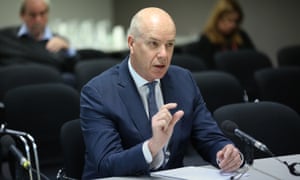
Restricting media ownership is irrelevant because Rupert Murdoch’s family already effectively owns a TV station, Foxtel, a radio station and newspapers in Australia, the Fairfax CEO has told a parliamentary committee.
“I suppose if anybody should be concerned about the rise and rise of News Corp it should be us,” Greg Hywood said at the public hearing of the communications legislation committee.
“I mean we are the traditional rivals. But our view is that this discussion is rather irrelevant at the moment.”
The legislation being considered by the committee would dump the longstanding media regulations known as the 75%-reach rule and the two-out-of-three rule.
Hywood was asked if dumping the two-out-of-three rule – which restricts cross-media ownership, preventing moguls from controlling a free-to-air TV station, newspapers and radio stations in the same market – would hand News Corp too much power.
He said: “If you actually look at News Corp’s assets in a two-out-of-three environment they’ve effectively got four-out-of-four. They’ve got their newspapers, there’s a family connection with a radio business, there’s effective control of Channel Ten and they’ve got Foxtel on top of that.”
The family connection refers to Rupert’s son Lachlan Murdoch who owns Nova Entertainment, a radio network which includes Smooth FM and Nova 969.
Hywood said relaxing the two-out-of-three rule may give News Corp Australia “more economic benefit” but it was worth it because local players could explore potential mergers.

The publisher of the Sydney Morning Herald and the Age said journalism had evolved dramatically since he entered the industry and wrote his stories on a typewriter for a single platform called a newspaper.
“At the moment journalists write stories and are massively adept at using multiple platforms,” he said. “That will continue and our reporters will continue to use all their skills but we need to look at the potential for a bigger chunk of the advertising market.”
Hywood said he wasn’t asking for protection in the form of GST relief or tax breaks but a level playing field would help traditional publishers like News Corp and Fairfax Media survive in competition with foreign players.
“Offshore players” like Google and Facebook were stealing advertising dollars but not providing any content or any public good in the form of journalism, he said.
“We want to invest in journalism; we want to invest in content; we want to make this a community that has __more transparency not less,” he said.
“We’re in an environment where we are restricted while others aren’t. So the organisations that are taking the bulk of the advertising operate with absolutely no restrictions to build their businesses further.
“We are providing a public good but hamstrung to try and develop our business.”
The CEO of Seven West Media, Tim Worner, also called for a level playing field, and used the hearing as an opportunity to ask again for the TV licence fees paid by commercial broadcasters to be dropped.
“The single most important regulatory change that needs to be made as a matter of urgency is to remove the current licence fee that is levied on the gross revenue of commercial television broadcasters,” Worner told the committee.
“Even after the modest cut to our fees made in the 2016 budget, Australian television licence fees remain the highest in the world by a country mile.
“Our licence fees are 15 times higher than those levied in the UK and __more than 100 times higher than those in the US. We need to get them down to international benchmarks, and that is well below 0.5% of gross revenue.”
Worner, who said the media reforms under consideration did not go far enough, said millions of Australians enjoyed free-to-air television which produced thousands of hours of Australian content each year.
However investing in new content was prohibitive with the impost of the license fees.
“More than anything else, licence fee reduction would genuinely help commercial television broadcasters to more effectively compete with new sources of competition from the likes of Netflix, Facebook and Google,” Worner said.
“This change would allow us to invest in more and better local content and to transform our businesses for the future.
“We have not sat on our hands as our world has changed. We continue to invest and innovate to remain relevant and evolve. But this requires us to invest in our business. And just like our competitors we should be able to deploy every dollar we make to its most efficient use. That is all we are asking.”